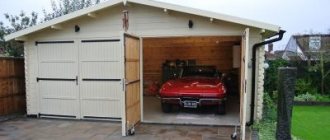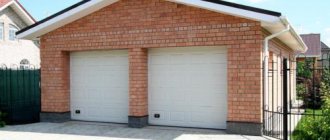Grounds for filing a claim
Cases when it is necessary to register ownership of a garage:
- Divorce. Property is divided between spouses.
- Transfer of ownership by deed of gift. The donor will first need to register the garage in his name.
- Ownership of the building for more than 15 years. This is true if the garage was built without permission without documentation.
- Inheritance. It is necessary to register the right to property for a certain person if the testator failed to do this.
- Garage demolition.
- Loss of building documents.
- The property is not listed in the cadastral register.
- Loss of documents permitting the construction of a garage. This is only possible if the authority that issued the papers no longer exists. In such a situation, the citizen will not be able to obtain duplicate documents.
- Getting a garage along with an apartment in a new building. Filing a claim is possible if the developer refuses to process documents for the property.
- Prohibition of the administration of the Garage-Construction Cooperative on registration of rights of ownership of shares.
- Other cases.
For illegal construction, the property owner may incur administrative liability.
Grounds for application
It is necessary to legalize the structure in the following cases:
- when inheriting property, it is necessary to register the right of a certain citizen, which the testator failed to do;
- when transferring ownership rights as a result of a donation, the donor must re-register the property in his name in advance;
- during divorce proceedings, when the property complex is divided between spouses;
- given the existing ban from the management of the Garage-Construction Cooperative for the owner of the box to register the rights of ownership of a separate share;
- lack of title documents, when the property is not registered in the cadastral register at all;
- before the demolition of the building by the city administration;
- in actual possession of the garage for more than fifteen years, if it was built without permission, and even without the necessary documents;
- loss of permits for construction, if the authority that issued them no longer exists and it is not possible to produce a duplicate;
- loss of documents for the erected structure;
- obtaining a garage along with an apartment in a new building, when the developer is in no hurry to prepare documents for the building;
- other cases.
How to register ownership of a garage in a cooperative?
How to legalize an unauthorized extension to a house, read here.
How to privatize land for free in 2020, read the link:
If specialists from the competent authority find out that the garage is an illegal building, the owner may incur administrative liability in accordance with Article 7.1. Code of Administrative Offences.
Attention! Our qualified lawyers will assist you free of charge and around the clock on any issues. Find out more here.
What could be the consequences?
If you do not register the right to own a garage in a timely manner, the construction will not be recorded in official documents. This may lead to the following consequences:
- Garage liquidation.
- Purchase of territory by another person who managed to complete all documents on time.
- Non-recognition of a garage as a real estate object;
- Delay in some completed documents.
- It is not possible to draw up a gift deed.
- Changing the procedure for recognizing property.
- A garage cannot be inherited after the owner's death.
These are not all the consequences that a citizen may face. For example, if material assets disappear from the garage, he will not be able to prove his involvement in this property. That is why you should never delay the preparation of documents.
How to file a claim
The application is drawn up in the form approved by the Code of Civil Procedure of the Russian Federation. The header of the document indicates the name of the court, full name. judge and plaintiff, as well as residential and registered addresses of the parties. In the middle is the name of the application.
Next comes the main text. Everything here is individual. For example, if the garage has been owned for more than 10 years, the statute of limitations for the purchase is indicated.
The following provisions are formulated below:
- On what basis and when did the owner acquire the garage.
- Defendant's culpable actions.
- The reason why there was a need to prove ownership of the object.
- The plaintiff's opinion on why the defendant violated his property rights.
On the ground under the garage
Land plots intended for the construction of garages are allocated by the municipality for perpetual use. As a rule, this territory is not the property of citizens and the cooperatives themselves.
Therefore, the privatization procedure is used to determine the owner. Legal practice has shown that when registering a land plot, citizens are refused.
In this case, the issue is resolved through the court. The main condition for filing a claim is receiving an official written refusal from the competent authority. This document will become the basis for sending the case to court.
A claim is being drawn up for the land under the garage. You will need to collect a wide range of documents that can prove the possibility of privatization. Finally, a request is submitted for recognition of ownership of the land plot under the garage.
To avoid being rejected, file your claim correctly. Below are sample statements that are recommended to be relied upon when drawing up an application.
When inheriting
Heirs often face problems regarding the transfer of property for personal use. Such situations arise if the testator did not have time to formalize ownership rights during his lifetime.
READ Claim for recognition of ownership of a house: sample, state duty
A statement of claim is drawn up to recognize the ownership of the garage as the deceased. This document speeds up the inheritance process and protects the property interests of citizens.
The claim must state the problem in detail and present available evidence of ownership of the inherited property. After this, you can go to court to make a decision.
A claim for recognition of ownership of a garage by inheritance must be filed in court for the heir to participate in the right to privatize the garage. This is relevant for those who have incorrectly completed documents for real estate or have no documents at all.
Along with the application, documents confirming the relationship of the citizen with the deceased are submitted. Also included:
- certificate from the Garage Construction Cooperative;
- a copy of the statement of claim (the number depends on the number of defendants and interested parties); a receipt confirming payment of the state duty;
- MBRTI certificate.
In some cases, plaintiffs wish to reflect a difficult financial situation. A copy of a pension certificate, a certificate of health and income is submitted with a basic list of documents.
Built without permission
After unauthorized construction of a garage, they contact the administration commission on construction issues. The commission must make a decision within 14 days and provide the opportunity to register the property.
If the issue cannot be resolved, the case is sent to court. A statement of claim is drawn up and a minimum set of documents is collected:
- a certificate from the register confirming that the object does not belong to other persons;
- certificate from the sanitary inspection;
- receipts confirming expenses for real estate construction;
- technical project;
- photocopy of passport;
- paper confirming the lease of the land plot, as well as ownership of the plot.
The package of documents may vary depending on the circumstances of the case. For example, if the garage is part of a cooperative, the citizen is required to provide a certificate confirming this fact. And also attach technical documents and a receipt for payment of the share in full.
The decision on an unauthorized garage will be reflected in the court extract. The document is issued at the court office at the appointed time. To receive it, you must show your passport.
If a refusal is received, the court decision can be appealed within 10 days. The appeal is filed with the arbitration court.
GSK
Often citizens are faced with a situation where the garage is not listed in the real estate cadastre. A certificate is obtained from the chairman of the GSK, which confirms that the person belongs to the Garage and Construction Cooperative.
Lawyers recommend preparing a technical plan for real estate in the BTI and registering the building with the cadastral register.
Contact the Rosreestr with a certificate from the chairman with a statement from the GSK. This can only be done after cadastral registration. The procedure is free of charge.
In the application, indicate personal information and reflect the current situation. The following documents are attached along with the claim:
- Help from GSK.
- A copy of the cadastral passport for the garage and land.
- A receipt confirming payment of the state duty.
- Construction plan on the land plot.
- A copy of Form 1 certificate for the garage complex.
- A copy of the extract from the register;
- GSK Charter.
- A copy of the certificate of entry into the Unified State Register of Legal Entities.
- A copy of the land lease agreement.
The list of documents may change.
Step-by-step instruction
If the owner of the garage is not a member of the GSK or owns it unofficially, he must:
- Contact the design organization. Conclude an agreement and receive a deed. Documents must be valid for a year.
- Make a document confirming the legal ownership of real estate. This is relevant for citizens who rent an object. A lease agreement is drawn up with the owner of the garage, and a certificate of the completed transaction is obtained from him. Make a copy of the agreement.
- Register the object with the BTI if it is capital (built from blocks or bricks, has a basement or foundation). Take an extract from the Unified State Register.
- Apply for a certificate confirming the facility’s compliance with fire and environmental safety.
Documents will be attached to the claim. If at the time of filing the application at least one document is missing, the court may refuse to consider the case.
Decision to recognize ownership of a garage
SOLUTION
IN THE NAME OF THE RUSSIAN FEDERATION
June 15, 2020 Ramenskoye
Ramensky City Court of the Moscow Region
as part of the presiding judge Bessmertnova E.A.
under secretary Novikova E.A.,
Having considered in open court civil case No. 2-2249/17 on the claim of Minaev D.V. against <…> third parties, for recognition of ownership of the garage,
u st a n o v i l:
Minaev D.V. appealed to the court with an updated claim, with which he asks to recognize his ownership of a non-residential building - a garage with a total area of <...> sq. m, located at: <address>, oblige <…> to register ownership of the specified garage. In support of the stated requirements, he indicated that <date>g. The head of the administration of the urban settlement of Udelnaya gave him consent to build a garage measuring <…> m at the address: <address>, with the obligation to remove an unauthorized dump at this place and keep the area clean and tidy. The plaintiff fulfilled his obligations, built a garage on the landfill site, monitored the sanitary condition of the land plot and cleaned it at all times. The garage was erected by the plaintiff at his own expense, with the consent of the Administration of the urban settlement of Udelnaya. It does not violate anyone’s rights and interests; the plaintiff is deprived of the opportunity to properly formalize the right to a garage, and therefore filed this claim in court.
At the court hearing, the plaintiff supported the stated demands and asked to satisfy the claim.
The representative of the defendant <...> did not appear, was notified, and an opinion on the claim was presented.
The representative of the third party <...> was absent from the court hearing, notified, no opinion on the claim was presented.
The court decided to consider the case in the absence of persons who did not appear, in accordance with Article 167 of the Code of Civil Procedure of the Russian Federation.
The court, having checked the case materials, believes that the claims are subject to satisfaction in part on the following grounds.
In accordance with Art. 11 of the Civil Code of the Russian Federation and Art. 12 of the Civil Code of the Russian Federation, the protection of violated civil rights is carried out by the court, in particular by recognizing the right.
By virtue of Art. 130 of the Civil Code of the Russian Federation, the objects of civil rights are immovable things (real estate): land plots, subsoil plots, isolated water bodies and everything that is firmly connected to the land, that is, objects whose movement without disproportionate damage to their purpose is impossible, including forests , perennial plantings, buildings, structures, unfinished construction objects.
According to Art. 213 of the Civil Code of the Russian Federation, citizens and legal entities can own any property, with the exception of certain types of property, which, in accordance with the law, cannot belong to citizens or legal entities.
From the documents presented to the court, it was established that by letter <number> dated <date>. <…> did not object to the construction of a garage measuring <…> m at <address> (on the left side of the center <…>) by D.V. Minaev, with the subsequent registration of the land plot (case sheet 16).
The head of the urban settlement of Udelnaya approved the layout of the garage with a total area of <…> sq. m in the city <address>, which is in the use of Minaeva D.V. (case file 17, 22). Minaev D.V. a garage made of foam blocks was erected on a foundation made of concrete monolith with a total area <…>. m lit.G.
The disputed garage is located in a row of existing garages, is a capital construction project, was erected in the absence of violations of urban planning norms and rules, which is confirmed by the Technical Conclusion <number> <…>
Thus, the case materials do not contain information about the construction of the said garage in violation of the requirements of the law in force at the time of construction; There are no signs of unauthorized construction.
The court comes to the conclusion that since during the entire period of use by the plaintiff Minaev D.V. the garage did not dispute his right to this property; improper execution of permits by the authorities cannot in itself prevent the recognition of the applicant’s ownership of the disputed garage in the absence of violations of the legislation in force at the time of construction of the building.
In accordance with paragraph 1 of Art. 218 of the Civil Code of the Russian Federation, the right of ownership of a new thing manufactured or created by a person for himself in compliance with the law and other legal acts is acquired by this person.
Taking into account that the disputed garage was erected on the basis of the appropriate permission from the executive authority, the garage was built at the plaintiff’s own expense, due to the above rules of law and the specific circumstances of the case, the court comes to the conclusion that the claim for recognition of ownership of non-residential premises has been satisfied - garage with total area <…> sq. m, located at: <address>..
In accordance with paragraph 1 of Art. 131 of the Civil Code of the Russian Federation, ownership and other real rights to immovable things, restrictions on these rights, their emergence, transfer and termination are subject to state registration in the unified state register by the bodies carrying out state registration of rights to real estate and transactions with it.
Since the court recognized the plaintiff's right of ownership of the garage, this right is subject to state registration in accordance with the procedure established by law by the plaintiff filing a corresponding application with the registration authority, the grounds for satisfying the claim for the obligation <…> to <…> to register ownership of the garage not available.
Guided by Art. Art. 12, 218 Civil Code of the Russian Federation, Art. Art. 196-199 Code of Civil Procedure of the Russian Federation, court
DECIDED:
The claims of Minaev D.V. are partially satisfied.
Recognize D.V. Minaev’s ownership of the garage lit.<…>, area <…> sq.m, located at: <address>.
In satisfying the requirement for the obligation <…> to register ownership of the garage to Minaev D.V. refuse.
A court decision that has entered into legal force is the basis for conducting cadastral registration of the specified residential building and state registration of the right to it.
The decision can be appealed within a month from the date of making the reasoned decision on appeal to the Moscow Regional Court through the Ramensky City Court.
Judge:
Where to contact
A claim for recognition of ownership of land or a garage is sent to a district or magistrate court. A citizen can submit an application himself or through a representative. In the latter case, the power of attorney must be notarized.
- If the amount of the claim is less than 50,000 rubles - to the magistrate's court.
- More than 50,000 rub. – district.
If the case is heard in a magistrate's court, 1 month is given for the time the verdict is rendered. During the hearing, the parties to the proceeding have the right to terminate the proceedings by signing a peace agreement.
The court's decision
If the case is heard by a magistrate, the time for rendering a verdict cannot be more than one month from the date the claim was accepted for consideration. The period for settling a dispute by a district judge is limited to two months.
Based on the results of consideration of the application, the court may make a decision:
- satisfy the claim for ownership of the garage;
- refuse to satisfy the claim.
Note! During the consideration of the case by the magistrate, the parties to the process have the right to terminate the proceedings by signing a settlement agreement.
Required documents
Registration of ownership of a garage is possible only after preparing the necessary documents. The list of papers may vary depending on the details of the case. But there is a basic list that is required for everyone:
- copy of the passport;
- extract from the cadastre;
- documents confirming ownership of property;
- technical project;
- certificates from sanitary services on compliance with fire and environmental standards;
- passport for the object;
- USR extract;
- documents reflecting the current location of the garage;
- information about the plaintiff’s monetary expenses that were spent on the construction or reconstruction of real estate.
What documents will be needed
The list of documents attached to the claim for recognition of ownership of the garage varies depending on the details of the case.
The most common documents included with the application include:
- a receipt confirming the fact of payment of the relevant state duty;
- technical documents (extract from the cadastre, passport for the object);
- a copy of the applicant's passport;
- documents that can confirm the applicant’s eligibility to own a garage;
- documents indicating that the garage has a specific location;
- documentary information about the plaintiff’s monetary expenses during the construction of the structure or its continued use (if this helps in considering the case);
- power of attorney of the representative (in case of transfer of powers);
- other documents confirming the validity of the plaintiff’s claims.









